The Quintessential
G.B.S. : Politics
|

|
George
Bernard Shaw
Fabian Essays in Socialism
London: The Fabian Society, 1889.
Shaw wrote for the Fabian Society from 1884 until 1929.
During that time he wrote sixteen tracts and edited at least two dozen
others. For this book, Shaw took charge of all aspects of production.
This included editing the text, writing the preface, compiling the
index, supervising the cover design by Walter Crane and the spine design
by May Morris, choosing the paper, selecting the type, and writing the
handbill announcement. Two of his essays appear in the volume, "The
Basis of Socialism: Economic" and "The Transition to Social
Democracy."
Sidney P. Albert -- George Bernard Shaw Collection
|
|
George
Bernard Shaw
Fabian Tract No. 13. What Socialism Is.
[London: The Fabian Society, 1890]
Sidney P. Albert -- George Bernard Shaw Collection
|

|
|
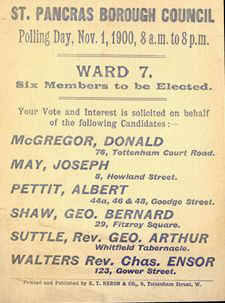
|
St. Pancras Borough Council
Polling Day, Nov. 1, 1900, 8 a.m. to 8 p.m.
Broadside, [London]: Printed
and Published by E.T. Heron & Co., [1900].
Shaw served for six years as a Borough Councillor for
St. Pancras, even though by 1903 he concluded "I am convinced that
the Borough Councils must be abolished." In the spring of
1904, he ran as a Progressive candidate for one of two London County
Council seats in South St. Pancras. With his defeat, Shaw dropped out of
local politics.
Sidney P. Albert -- George Bernard Shaw Collection
|
|
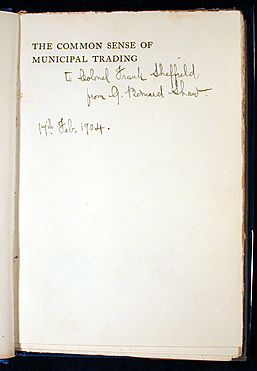
|
George Bernard Shaw
The Common Sense of Municipal Trading.
Westminster: Archibald Constable & Co., Ltd., [1904].
Presentation copy to Colonel Frank Sheffield. Also shown
is the first page of a letter to Colonel Sheffield, dated 17th Feb. 1904.
On the reverse Shaw writes : "I send you a copy of my last book, in which I
have tried to freshen up my subject."
Sidney P. Albert -- George Bernard Shaw Collection
|
|

|
|
George Bernard Shaw
Is Free Trade Alive or Dead? A Lecture by Bernard Shaw at the
Glasgow Fabian Society at the City Hall, Glasgow, October 2nd MCMIII.
London: Printed for Private Circulation by George Standring, 1906.
A very scarce pamphlet.
Sidney P. Albert -- George Bernard Shaw Collection
|
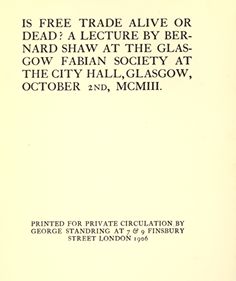
|
|
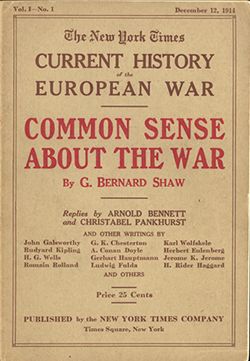
|
George Bernard Shaw
"Common Sense About the War"
Special War Supplement to the New Statesman, November 14, 1914.
London: The Statesman Publishing Co., Ltd., 1914.
Shaw was both praised and vilified for this work written
after the beginning of World War I. He saw that winning was a practical
necessity, but refused to glorify it in any way. He held that war could
have been avoided, but was the product of a bankrupt political system
that required a complete overhaul.
Sidney P. Albert -- George Bernard Shaw Collection
|
|
George Bernard Shaw
Stereotyped Postcard, signed, to Miss Ruth G. A. Long.
London, February, [1915]
Shaw received so many letters relating to "Common Sense
About the War" that he had this postcard printed for his use in
responding to friendly letters, while writing letters to his critics. To
this card he has added: "Exaggerated! Bless me! if you only knew all
the things I know and didn’t say! it was shamefully watered
down."
Sidney P. Albert--George Bernard Shaw Collection
|

|
|
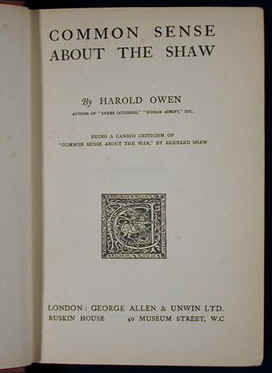
|
Harold Owen
Common Sense About the Shaw … Being a Candid Criticism of
"Common Sense About the War," by Bernard Shaw.
London: George Allen & Unwin Ltd., [1915].
Shaw was called a traitor for his "Common Sense"
by many of his peers who socially ostracized him, at least until death had
touched every household in Britain.
The epigraph for this work reads:
Now tell us all about the Shaw
And what he wrote his sloshtosh for.
-- A Misquotation.
Sidney P. Albert -- George Bernard Shaw Collection
|
|
George Bernard Shaw
War Issues For Irishmen: An Open Letter To Col. Arthur Lynch From Bernard
Shaw
Dublin and London: Maunsel & Company Limited, 1918.
This is one of the rarest of Shaw’s pamphlets. Shaw wrote the
text in September, 1918, but it did not appear in print until after the
Armistice was declared. A few copies were sent to him, and the remainder Shaw
ordered pulped.
Sidney P. Albert -- George Bernard Shaw Collection
|

|
|
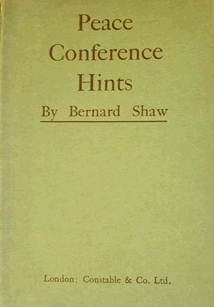
|
George Bernard Shaw
Peace Conference Hints.
London: Constable and Company Limited, 1919.
This essay first appeared in the weekly New York American, from
January 19 to March 23, 1919. It was republished in 1930 in the collection
entitled What I Really Wrote about the War.
Sidney P. Albert -- George Bernard Shaw Collection
|
|
George Bernard Shaw
Ruskin’s Politics. G. Bernard Shaw.
[London]: The Ruskin Centenary Council,
[Printed at the Oxford University Press by Frederick Hall], 1921.
Shaw delivered this lecture on November 21, 1919, at the Ruskin
Centenary Exhibition held at the Royal Academy. In dealing with Ruskin the
politician, he stated that "in all classes [Ruskin’s] disciples were the
few who were at war with commercial civilization. I have met in my lifetime some
extremely revolutionary characters; and quite a large number of them, when I
have asked, ‘Who put you on to this revolutionary line? Was it Karl Marx?’
have answered ‘No, it was Ruskin.’ Generally the Ruskinite is the most
thoroughgoing of the opponents of our existing state of society."
This is the first issue of this edition. The 'G.' in Shaw’s
name was deleted on the upper cover label for the second issue.
Sidney P. Albert -- George Bernard Shaw Collection
|
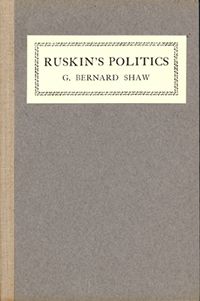
|
|
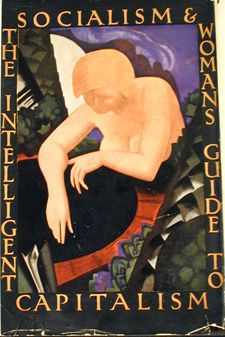
|
George Bernard Shaw
The Intelligent Woman’s Guide to Socialism and Capitalism.
London: Constable and Company Ltd., 1928.
In 1924, Shaw’s sister-in-law, Mary Stewart Cholmondeley,
asked him to write a pamphlet explaining Socialism. This book was the result,
and Shaw dedicated it to her as "the intelligent woman to whose question
this book is the best answer I can make." He considered it to be the first
book on economics and political science written for women instead of for "a
sort of abstract reader who is conceived as aridly and academically male as far
as he is conceived of having any sex at all."
This copy is inscribed: "To Clara and Henry Higgs, without
whose helpful work this book could not have been written, from G. Bernard
Shaw." Clara Higgs was cook-housekeeper for the Shaws at Ayot St. Lawrence
and her husband Harry was the gardener. The dust jacket was designed by Eric
Kennington, one of the artists commissioned by T. E. Lawrence for Seven
Pillars of Wisdom.
Sidney P. Albert -- George Bernard Shaw Collection
|
|
George Bernard Shaw
The League of Nations.
London: The Fabian Society, 1929.
Issued as Fabian Tract No. 226, Shaw’s essay on "The
League of Nations" first appeared in the English and American press
during October and November, 1928. It was first collected in the volume
published in 1930 as What I Really Wrote about the War.
Sidney P. Albert -- George Bernard Shaw Collection
|
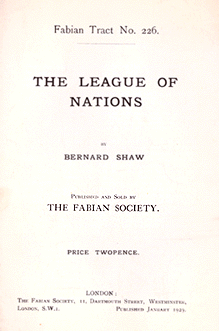
|
|
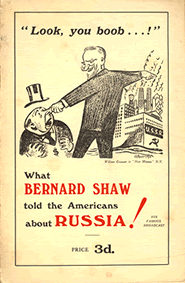
|
George Bernard Shaw
"Look, you boob …!" What Bernard Shaw told the American about
Russia! His Famous Broadcast.
[London: Printed by Holbrook & So, Ltd., 1931]
Sidney P. Albert -- George Bernard Shaw Collection
|
|
George Bernard Shaw
What I Really Wrote about the War.
New York: Publishers Brentano’s, [1932].
The dust jacket for this edition was designed by Alexander
Nesbitt.
Sidney P. Albert -- George Bernard Shaw Collection
|
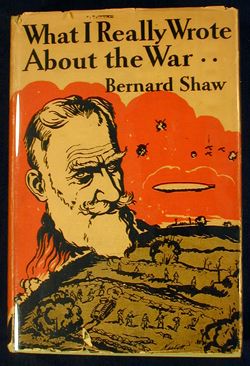
|
|

|
|
The Academy of Political Science, Columbia University, New York
Program of Special Meeting in Honor of George Bernard Shaw given … at the
Metropolitan Opera House, New York City.
[New York, 1933]
Shaw’s address before the Academy of Political Science on
April 11, 1933 was broadcast live over the NBC network, and published verbatim
in the New York Times, April 12. An unauthorized edition was published in
Hollywood shortly thereafter entitled "American Boobs … Complete Text of
the Great British Satirist’s New York Address Treating of Banksters, 100%
Americans, Orators, Constitutions, Private Czars, Dictators, Hollywood, Mormon
Polygamy, Politicians, Newspapers, Stock Brokers, Lunatics, War Debts, Russian
Communism, Racketeering, and Many Other Live Topics."
The authorized American edition appeared in the summer of 1933
as The Future of Political Science in America. A British edition appeared
shortly thereafter as The Political Madhouse in America and Nearer Home.
Both are shown below.
Sidney P. Albert -- George Bernard Shaw Collection
|
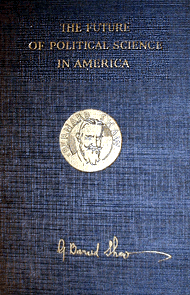
|
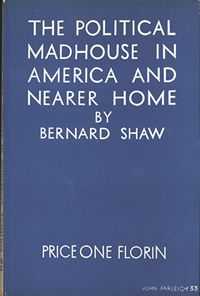
|
|
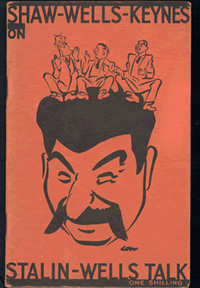
|
George Bernard Shaw et.al.
Stalin-Wells Talk. The Verbatim Record and A Discussion by G. Bernard Shaw,
H. G. Wells, J. M. Keynes, Ernest Toller and others. With three caricatures and
cover design by Low.
London: The New Statesman and Nation, December 1934.
Sidney P. Albert -- George Bernard Shaw Collection
|
|
George Bernard Shaw
Everybody’s Political What’s What?
London: Constable and Company Limited, [1944].
The working title for this book included the subtitle, "Machiavelli
Modernized," deleted by Shaw from the final page-proof.
Sidney P. Albert -- George Bernard Shaw Collection
|
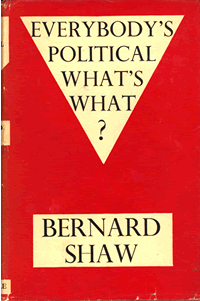
|
Shaw Exhibit | About the collection | Special Collections Home |
Library Home |
Brown Home
© 2000, Brown University Library. All rights reserved.
Last Updated: Tuesday, 17-Mar-2015 13:39:18 EDT
|

